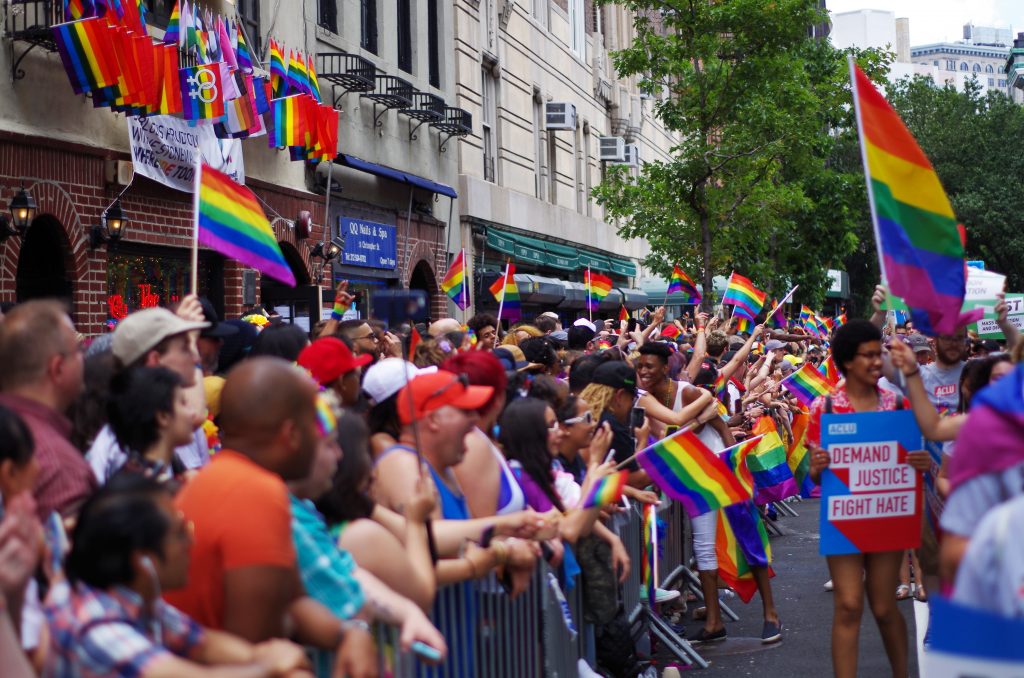October is LGBTQ History Month in the United States. To celebrate, let’s look at history being made in the fight for LGBTQ equality. Currently, 27 states do not explicitly have legislation that prohibits public accommodations discrimination based on sexual orientation or gender identity. Following the ruling of Masterpiece Cakeshop v. Colorado Civil Rights Commission, which ruled in favor of Masterpiece Cakeshop owner Jack Phillips, a baker who cited his religious beliefs in denying a wedding cake to a gay couple, many conservative Americans have taken this ruling as a green light, allowing public accommodation to discriminate against LGBTQ individuals.
Additionally, with the recent confirmation of Justice Brett Kavanaugh to the Supreme Court of the United States, the chance of the Supreme Court expanding LGBTQ rights, and civil rights more broadly, are grim. Without the more moderate Justice Anthony Kennedy sitting on the bench, anti-LGBTQ conservative groups may be emboldened to bring more legal challenges to the court regarding LGBTQ civil rights issues, preventing expansion of LGBTQ rights and restricting current rights of LGBTQ Americans. According to the LGBTQ advocacy group Lambda Legal, currently one in 10 of Circuit Court of Appeals justices are Trump appointees, allowing conservative judges all over the country to undermine the Obergefell v. Hodges ruling and significantly altering people’s civil rights from a wide range of issues including LGBTQ discrimination, abortion access and racially discriminatory voting policies.
Two major concerns for LGBTQ Americans include anti-discrimination legislation and hate crime legislation. Currently, 16 states have religious exemption laws that allow state-licensed child welfare agencies, medical professionals or private businesses to refuse services to LGBTQ Americans. Another legal fight for LGBTQ Americans is the passage of hate crime laws. Currently, 20 states do not have hate crime legislation that requires state prosecutors to investigate and prosecute crimes with bias against a victim’s sexual orientation. Another 33 states do not require prosecutors to investigate and prosecute crimes with bias against a victim’s sexual orientation. This is particularly worrisome for transgender Americans. In the year 2017, there were 29 documented murders of transgender women and men. Transgender women of color have been disproportionately affected by these hate-motivated murders and other motivated crimes. Given the current state of the courts as shaped by Trump and the Republican-held Senate, it is unlikely that progress in civil rights will occur in the courts.
In a more optimistic light, there has been a record number of candidates of LGBTQ Americans running for political office across the country. With more than 200 LGBTQ candidates, they may be central to flipping Congress and state governments in favor of Democrats. Notably, Christine Hallquist, the Democratic candidate for Vermont’s governorship, has made history as the first transgender major party nominee for governor in the United States. Another notable LGBTQ candidate is Sharice Davids, running on the ballot as the Democratic candidate for Kansas’s 3rd congressional district. The race is tight between Davids and the incumbent Kevin Yoder, who has a zero LGBTQ rights voting record rating according to the Human Rights Campaign and has publicly opposed same-sex marriage equality. If elected, Davids would be the first lesbian Native American woman elected to the House of Representatives, and the first lesbian congresswoman from Kansas. Progress for LGBTQ civil rights is more likely to occur in legislators.
This trend of more LGBTQ candidates running for office has been following a larger pattern in the Democratic party for the 2018 midterm election, in which more minorities and progressive candidates have decided to run for office in response to the 2016 election of Trump. Despite the unpropitious look at the courts, the rise of LGBTQ candidates running for office will play a pivotal role in the fight for LGBTQ civil rights in the era of Trump.



